They came, they saw, they stayed
A side effect of the Great Recession was an opportunity for the University of Dayton. When the value of endowments plummeted in 2008, schools with very large endowments became cautious about spending; many instituted faculty hiring freezes. For that and whatever other reasons, the University “enjoyed larger than usual faculty applicant pools during and immediately following the 2008-09 recession,” said Paul Benson, then dean of the College of Arts and Sciences and later (2014-23) provost and executive vice president for academic affairs.
And UD, reading the signs of the times (as Marianist co-founder Blessed William Joseph Chaminade might say) seized the opportunity. It hired, and it hired well. Of the 50 or so full-time faculty members hired from 2008 to 2010 and still at UD, more than half are serving or have served in positions of leadership; more than 20 as program directors, department chairs and endowed chairs — and others as associate provost, assistant provost, dean and assistant dean.
That some of them began their UD careers in non-tenure-track positions, Benson said, “is one mark of the highly competitive, especially talented applicant pools we saw during this period.”
The faculty who began their careers then benefitted from the University’s innovative professional development program, Leadership UD, as well as from the Hiring for Mission faculty retreat, from a mandatory-for-tenure-track-faculty second-year retreat, and from the flourishing of UD’s Common Academic Programs since its approval in 2010 and full launch in 2013.
The result is a cadre of faculty members, highly talented and dedicated to the University’s Catholic, Marianist mission.
Here are the stories of six of them.
Katy Kelly
Where did all the students go? To the library – really!
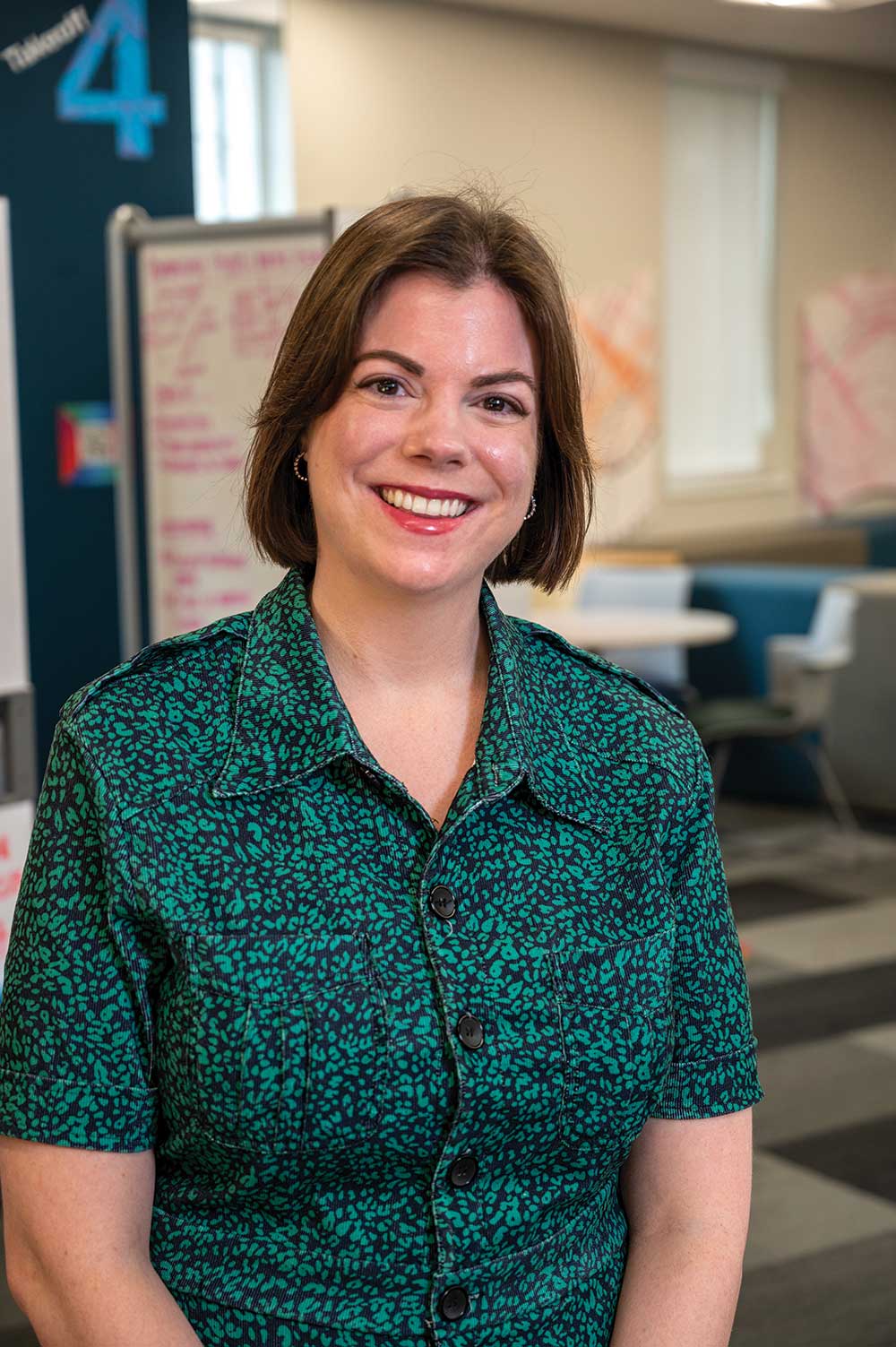
“Most people’s paths are not linear.”
That was an observation student employees in Roesch Library heard from Katy Kelly and her colleagues during a professional development session. “We talked about our journeys. We said, ‘If you don’t like what you are doing, it’s not the end of the world,’” said Kelly, assistant dean for strategic communication and outreach. “Reflect. If you think you need a change, you can get help.”
Kelly’s path, however, has been — in terms of education and professional experience — linear. “I’m an outlier,” she said. She graduated in 2008 from Ohio University with a degree in communication, planning on going to grad school in library science. In 2010 she graduated from Syracuse University with a degree in library science.
A job was open at Dayton; it required degrees in communication and library science. She’s now an assistant dean and a full professor — the highest rank a professor can achieve. “I’m in a perfect place, combining my interests and passions. I now have time and effort to give, and UD is the perfect place for that.”
For many people and for libraries, however, the world has not been following a linear path. Not long ago some pundits were predicting paperless offices and bookless libraries. But the future is often cloudy. We may live in a digital age, but offices have printers and libraries, books — and more.
Since she started at UD, Kelly has been communicating what the library has to offer to campus and the wider community.
“In the library, everyone collaborates. Communication is the connecting thread.”
Part of that collaboration is donor-funded, themed (this year, Taylor Swift) end-of-the-year programming for students, offering therapy dogs and hot chocolate. Similar programming is now being done around midterms. “We heard from students that it’s not just finals that are stressful,” Kelly said.
Communicating and connecting were also a major part of Kelly’s role in Roesch Refresh, a physical updating of the library. “With journals moving upstairs,” she said, “the second floor was a blank slate.”
What would it look like without books? How would it be used? Kelly engaged groups of students, encouraging their observations, eliciting suggestions. A result was Concourse D, a 6,000 square-foot open space on the second floor that now fosters creativity, collaboration and community.
It opened in 2019. Then came COVID; 2020 was not the best time for in-person collaboration. But now the library is busy, even early in the semester.
“After COVID,” she said, “students want to be out, see old friends and meet new ones. And, in the library, you don’t have to buy anything, you can stay as long as you want (well, until 5 a.m. most nights), and there’s a safe, comfortable space that will fit your noise, chair height and lighting preferences.”
Elizabeth MacKay
From a couple of classes to a couple of books. Adjunct to tenured.
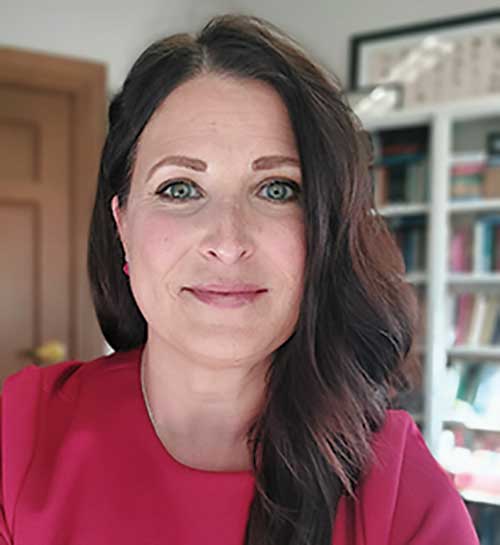
In 2008 as the bottom fell out of the stock market, Elizabeth Mackay was looking for a job. She came to Dayton and talked to the outgoing chair of the UD English department as he was packing up his office to move out. “He offered me a couple of classes for the fall,” she remembers.
So she began her UD career as an adjunct, a non-tenured position, often for one semester at a time — pretty much the bottom of the faculty pecking order at American universities. Soon, however, full-time lectureships opened up and she gained one.
Today she is tenured, an associate professor and on sabbatical finishing one book and researching another. (She’s also an advocate for lecturers and adjuncts.) She’s just finished a term as coordinator of the Humanities Commons, a collaboration of English, history, philosophy and religious studies — the departments providing the first-year humanities component of UD’s Common Academic Program.
“UD has given me opportunities,” she said. “I keep looking for more.”
During the last eight years, opportunities have come from her work teaching first-year students in UD’s Core Program, an interdisciplinary approach to the humanities base of UD’s Common Academic Program. Students gain credit in English, history, philosophy and religious studies. On Tuesday and Thursday mornings, they attend a large lecture by one of Core’s eight faculty members; the other seven also attend. Tuesday and Thursday afternoons, they break up into seminar-size sessions. Each day is a different topic, organized chronologically — it’s like Western Civ on steroids.
“The first-year Core course,” Mackay said, “is the best I’ve ever ‘taken’ let alone taught. It’s a delight to be a ‘student’ in this course, learning from my colleagues, who are experts in their fields — and excellent teachers. And the students are a delight — curious, inquisitive, smart, fun.”
“... the students are a delight — curious, inquisitive, smart, fun.”
The fast pace and extensive content of the course can be hard. “But when students get in the weeds,” Mackay said, “I point out that their colleagues are taking four classes separately. And the small seminar size helps them with not being overwhelmed.”
Mackay’s area of research in English is the early modern period (1500-1700) and rhetoric. She is currently completing a book that explores how mothers taught their daughters in that period. They did so not only in person but also by writing books of advice.
Mackay’s lecturing on nation-building for Core broadened that interest into looking at women of that period writing women’s histories. “Writers were making England a unified nation,” she said, “by having it look at its past.” So she is now doing research on a new project that explores women writing history and early modern nation-building in Western Europe.
She looked for opportunity; she found it.
Sam Dorf
Teaching, research, service. A trifecta, plus playing a bit of viola da gamba.
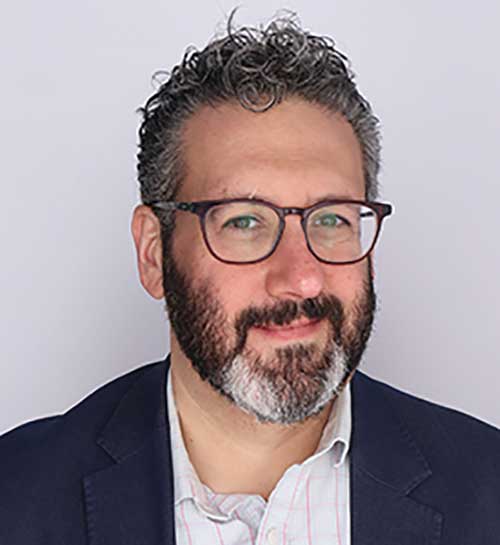
“I came to UD because I needed a job,” Sam Dorf said.
In 2010, the job market in the wake of the Great Recession was very tight. “I was cleaning houses, among other things,” Dorf said, “I would have taken an academic job anywhere.”
“Anywhere” became Dayton; that turned out well for him and for the University. Hired as a lecturer (a non-tenure-track position), with little expectation for long-term employment, Dorf is now tenured and a full professor of music.
And busy. From 2021 to 2023, he served as president of the Academic Senate, which is responsible for academic and educational policies; this year, the acting director of the UD Honors Program. In August he will become the Alumni Chair in the Humanities; he plans in that position to use the skills learned in the Senate to expand collaboration between the broader community and UD faculty and staff.
Dorf’s academic specialty is the reception of early music; his book Performing Antiquity: Ancient Greek Music and Dance from Paris to Delphi, 1890-1930 was published by Oxford University Press. He plays the viola da gamba, an early music cousin of the cello, and still finds time to practice. “Practice,” he said, “may not make perfect. But it does make better.”
He enjoys connecting the past and the present; he thinks each concert, even early music concerts, should have at least one living composer. For example, for an early music ensemble in which he played, his colleague soprano Andrea Chenoweth Wells ’00 sang songs by English Renaissance composer William Byrd (such as “Blessed Is He That Fears the Lord”) as well as Dorf’s arrangements of songs (“Jolene,” “I Will Always Love You”) by Dolly Parton, one of his favorite living female songwriters.
“I loved working on the Senate,” he said. “It was an absolute joy. They were people who cared.”
UD’s Academic Senate is not just a faculty senate; it also includes administrators and students. “I represented faculty, administrators and students,” he said, noting that “students not only had ideas but made proposals that turned into policies, for example, the midterm grading policy.” Pre-COVID, midterm grades were required only for first-year students. The pandemic upheaval prodded a change to require them also for sophomores. Starting next fall all undergraduates will have them.
One of the things he misses most about the time he spent on the Senate, he said, is the custom of starting meetings with a prayer or meditation or, in his case once, William Byrd’s setting of the offertory and alleluia for the Mass for the Feast of the Annunciation. “We shared meaningful reflections,” he said.
“UD is a magical place.”
Verb Washington
In the dean’s office. And West Point, Baghdad, London, Paris …
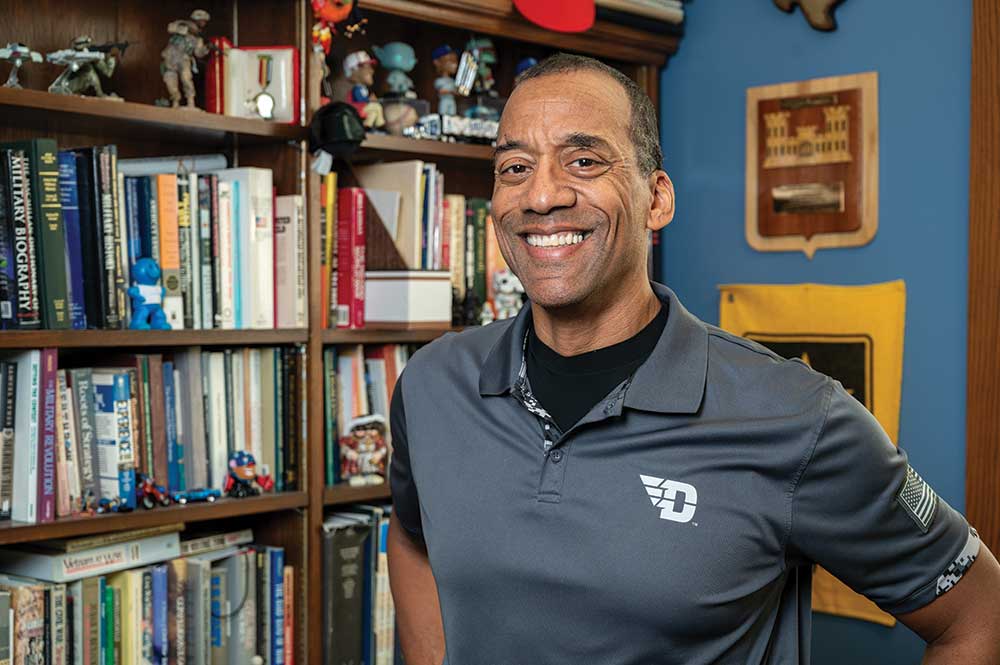
Verb Washington grew up a self-described Army brat. Since Ohio has no Army bases, he knew little about it until, while himself serving in the Army, he went to Ohio State University to earn a doctorate in history. After serving in faculty positions at West Point and the Command and General Staff College, he took command of UD’s ROTC unit.
“I could have been assigned to Ohio State if I had waited a year,” he said, “or come immediately to Dayton, which I did. It had sounded like a state school; I knew I didn’t want a small, Catholic school because the word was their students weren’t particularly interested in the military.
“But God was looking out for me.”
Four years later, his tour concluded and he applied for a position in the history department. He got it. He was also promoted to colonel. But that would entail three more years of service. UD offered him the opportunity to serve the three years and then take up the faculty position.
So he went to Baghdad to serve on the staff of Gen. David Petraeus as senior liaison officer at the Iraqi National Operations Center. The experience ran an emotional gamut.
A girl in a village in northern Iraq had fallen in love with a member of al-Qaida; the village elders stoned her to death. Three truckloads of explosives driven by al-Qaida suicide bombers destroyed the village. Washington’s job was to travel to the site to assess the damage and determine what aid was needed.
At another time, he received a call that the prime minister was going to London and needed landing clearance; the plane was already seven hours out. “So I called the airport,” Washington said. “The only question was, ‘How would you like to pay?’” Fortunately, the prime minister carried cash.
When the Iraqi national soccer team returned after four years out of the country, Washington went out in civilian clothes. “But in Iraq it’s hard,” he said, “for a 6'6" Black man to be inconspicuous.” Especially with soccer players dancing on top of his truck.
At the end of his tour, Washington returned to UD in 2010 to teach history and, starting in 2016, to serve as assistant dean in the College of Arts and Sciences.
Since 2015 he has also gone on study abroad trips with engineering students; he graduated from the U.S. Military Academy with a degree in electrical engineering.
In London, he taught about the Crossrail project, a massive subway expansion bringing to London workers from the suburbs who couldn’t afford to live in London. “The project had people at its heart,” he said, “and allowed for sustainable engineering, for example, sloping tracks going into stations to aid braking and thus save energy.”
In Paris, he taught about Hitler’s Atlantic Wall, the largest construction project of its time, a series of coastal fortifications from southern France to Norway, built with slave labor.
“It did not,” Washington said, “have a concern for sustainability, or the lives of workers.”
Ryan McEwan
Not too big, not too small. A good place for serious student research.
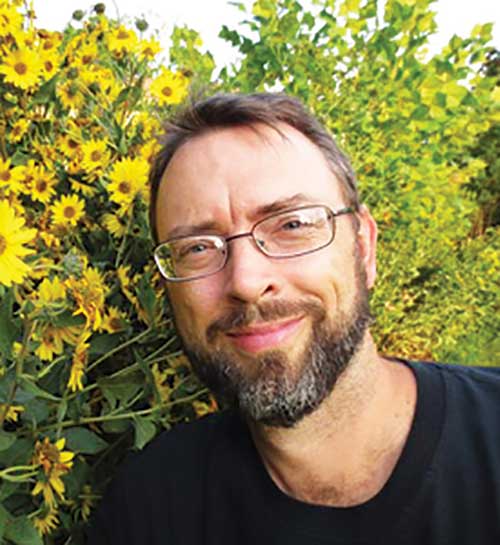
With a doctorate in environmental and plant biology in hand and post-doctoral experience, Ryan McEwan had an offer of a research job paying much more than the University of Dayton could. But at Dayton he saw an opportunity.
When applying for a job at UD, he interviewed with Paul Benson, then dean of the College of Arts and Sciences. “That one meeting influenced my whole career,” he said. “I came out of it with the sense that there’s this person in leadership with this kind of integrity and intellect. There’s an ethical center to the institution.”
He and others hired at the time, he said, “had the sense of UD as a destination; it was about mission. And the sky was the limit.” Speaking to new faculty a couple of years ago, McEwan, now the Schuellein Chair in the Biological Sciences, spoke of that new group’s creative energy, labeling it “aspiration.” He gave them practical advice — to take care of their physical and mental health, to work on developing their expertise.
“... there is an idea at UD called ‘the Marianist charism.’ When I first came to UD I thought it was geological formation!”
But he also told them that “there is an idea at UD called ‘the Marianist charism.’ When I first came to UD I thought it was geological formation!” But he told the group that it’s actually an “empathetic approach to community.” He counseled them to form relationships with people from outside their areas of expertise, noting that a no-agenda lunch can lead to both success and happiness.
Within his area of expertise, he is also very adept at building relationships. His website, The McEwan Laboratory, demonstrates a community of undergraduates, graduate students and alumni as well as his own extensive research.
“In biology at UD,” he said, “there is opportunity for students to interact with faculty in serious research. In some schools, only grad students can do that; and smaller schools might not have serious research.”
In his lab, he noted, there are undergraduate students who are just getting started in research and also juniors and seniors who have a lot of experience. “Some are quite serious,” he said. “The more experienced students provide a model for freshmen and sophomores.” And graduate students provide substantial mentoring. Building that mentoring community within the lab, he said, “is the most exciting part of the job. It’s the reason I came here; it’s what I talked about with Paul Benson.”
McEwan said he and his students “are trying to answer questions to which no one knows the answers,” he said. “That is exciting, a unique experience.”
Some of his students go on to do research; many go into other fields. But they leave, he said, with “the belief that they can lead, can be in charge of something, with the attitude of whatever it is, I can do it.”
Kim Bigelow
UD students impressed her. So she decided to teach them human-centered engineering.
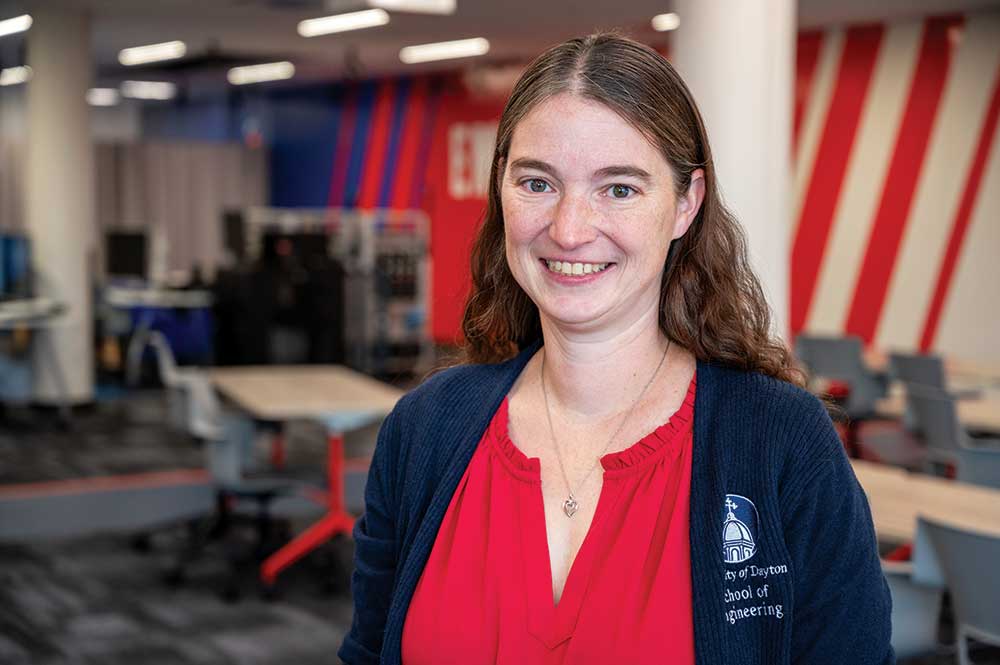
“As a freshman, I got into research,” said Kim Bigelow. “That changed my trajectory.”
Today Bigelow is a professor of mechanical and aerospace engineering at UD, serves on the School of Engineering dean’s cabinet and directs the Engineering Wellness Through Biomechanics Lab. And she is the winner of UD’s 2023 Faculty Award for Teaching.
When she left Ohio State University in 2008 with her doctorate in mechanical engineering, teaching was not on her horizon.
She was working in biomechanics with an engineering firm in Columbus, Ohio, when she was interviewed by a public television station about encouraging middle-school girls to study STEM. David Herrelko, a retired Air Force general who held the Bernhard M. Schmidt Chair in Engineering Leadership at UD, was impressed by her commitment to women in science, technology, engineering and math and invited her to speak to first-year engineering students.
“So I came a couple of times,” Bigelow said. “I was impressed with UD students; they were comfortable talking to professors and to each other. And they were committed to learning.” UD was starting a biomechanical engineering program. She was hired in 2009.
“I love teaching,” she said. Having been taught in a 500-seat classroom her freshman year, she was impressed with the smaller class sizes here. “Here we can sit in class and have discussions, for example, on concussions and designing football helmets.”
And she enjoys watching her students learn. “It’s exciting to see them making connections,” she said, “working on engineering that’s human-centered. I believe that whatever your passion is, you can bring that into engineering. I want students to see the breadth of engineering that I saw.”
“I believe that whatever your passion is, you can bring that into engineering. I want students to see the breadth of engineering that I saw.”
Student projects have included adaptive living devices for people with disabilities, toys that can be used by children with diverse physical abilities and a bicycle for a family so their adult child who has cerebral palsy could return to bike riding with them.
In her 15 years here, more than 150 undergraduate students have engaged in undergraduate research through her lab. This year students in her lab are building a stage for Irish dancers. Top dancers will be monitored in a study on how to prevent injuries.
She also collaborates with the doctor of physical therapy program. One area of study has been falls among people with dementia. Currently a doctoral student is expanding this work with a local housing facility to study falls among older Black adults.
“UD is unique in its collegial, collaborative nature,” Bigelow said. “You can pick up the phone and just call someone across
campus.”
Photos by Brigham Fisher